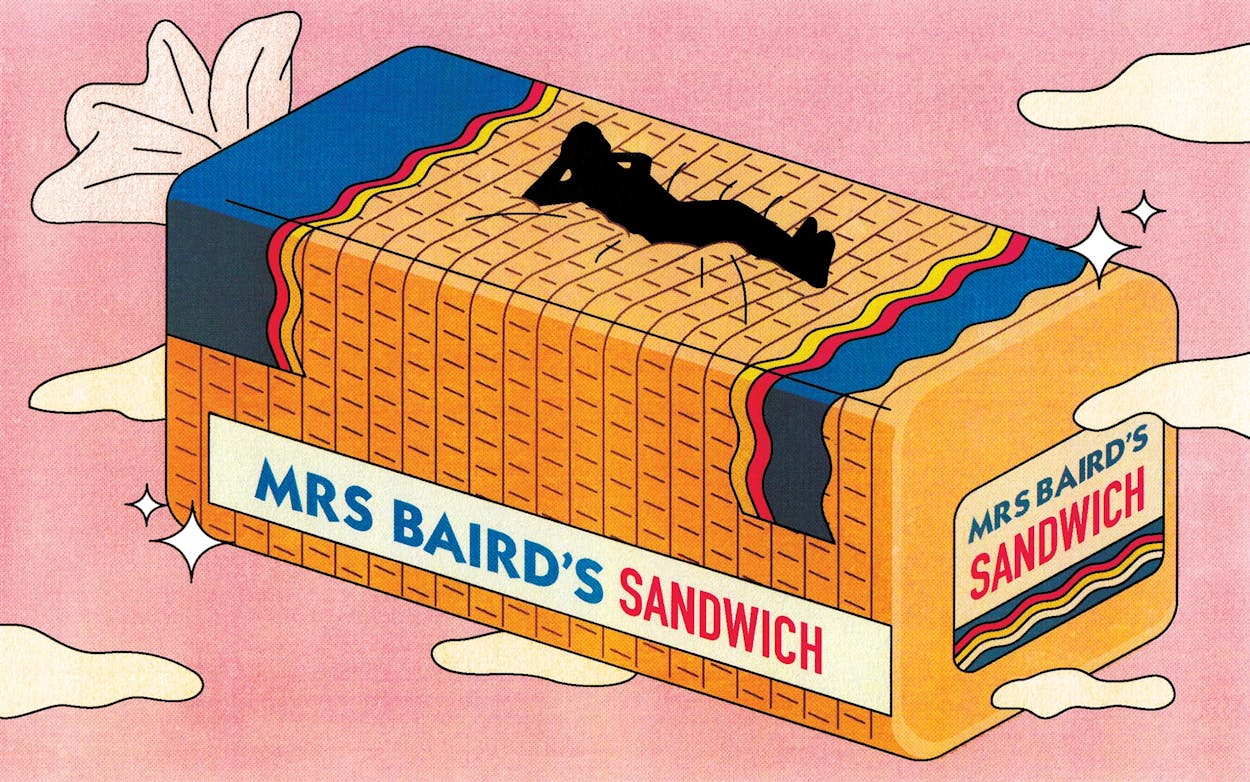Generations of Dallas denizens can still recall zipping past the Mrs Baird’s factory along North Central Expressway at Mockingbird Lane and encountering the heavenly scent of baking bread. For decades, the aroma permeated the area. Though the factory has been closed for more than twenty years, I can still almost smell it. I suspect you’d hear much the same from anyone who grew up near the company’s other bakeries, which at one time stood in Abilene, Austin, Fort Worth, Houston, Lubbock, San Antonio, Waco, and elsewhere. In the early sixties, Mrs Baird’s accounted for one out of every four loaves of bread sold in Texas.
For me and so many other Texans, any thought of Mrs Baird’s is paired with the heavy weight of nostalgia. I remember wishing my mother would stop in at the company’s outlet store, in my hometown of Denton, anytime we drove past it. Could I convince her to let me get one of their hand pies, or a pack of the mini powdered donuts that had such a strangely pleasant cooling sensation whenever you sat one whole upon your tongue?
I think back also to elementary-school field trips. Oh, how I envied the fluffy, white Mrs Baird’s bread of the sandwiches in the field-trip sack lunches of my classmates. I was usually stuck with some “healthier” store-brand, whole-grain wheat nonsense. You can find whole wheat options among Mrs Baird’s products, of course, but it’s that whitest of white breads that most readily comes to mind whenever I see the company’s familiar blue, white, and yellow logo. Packed with sugar and preservatives, and indeed stripped of so-called “nutritional value,” Mrs Baird’s white bread serves as a culinary blank slate. It yields easily in the mouth and can sop up every bit of flavor you apply to its surface—which is perhaps why it remains an essential accompaniment to many a three-meat plate at countless barbecue joints across the state.
The woman behind the company responsible for this magisterial feat of comestible engineering, Mrs. Baird herself, wasn’t some fictional character dreamed up by a marketing team. Hers was a truly Texan success story. Originally from Tennessee, Ninia Lilla (Ninnie) Baird came to Fort Worth in 1901 with her husband, William. She baked bread, cakes, and pies for the restaurant that William ran until complications from diabetes prevented him from continuing to work. Ninnie sold the restaurant and founded Mrs Baird’s Bread in 1908. In its earliest days, her eight children all helped with the business. The boys would deliver loaves to their neighborhood customers via bicycle.
Demand for Mrs Baird’s baked goods grew precipitously from there. When Ninnie died in 1961, at age 92, Mrs Baird’s was the largest family-owned bakery in the country. Her descendants continued to run the company for decades, until a bankruptcy in the nineties, which eventually resulted in it being sold to the Mexican multinational food company Grupo Bimbo.
By most accounts, Mrs Baird’s bread hasn’t been quite the same since. Its footprint in the state isn’t anywhere near what it once was, but its branding still proudly declares that it was “Born in Texas,” and it remains “Baked in Texas.” And that logo can still conjure those sensory memories—the smells that filled the air of so many Texas cities, and the flavors that for so long have sat on the countertops of so many Texas kitchens.
- More About:
- Fort Worth
- Dallas








